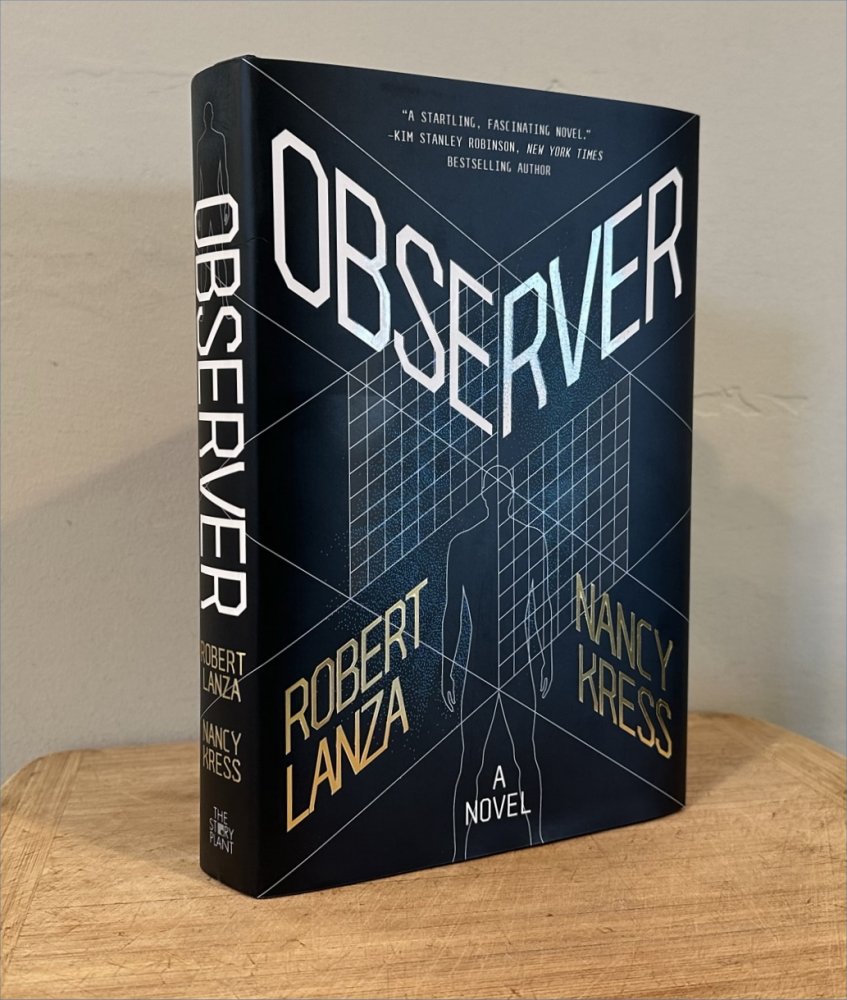(The Story Plant, January 2023, 380pp)
This is a hard science fiction thriller that impressed me in many ways, though I’m not a regular reader of thrillers per se and perhaps am not in a position to judge the book as a thriller. (Just as SF novels written by literary writers often fail in ways literary readers don’t realize, not knowing the standards of SF.) But it does have many of the elements that have made Kress a preeminent hard SF writer for decades now, a point I made when I reviewed her 1991 novella “Beggars in Spain,” here. She does hard science, and she does characters and plot very well too.
Now who is Robert Lanza? Apparently an author of best-selling nonfiction, e.g. the Biocentrism trilogy, that led Time Magazine to name him one of the “100 most influential people in the world,” according to the dust jacket here, but whose subject matter struck me as a tad too woo for me to pay attention to. But I suppose more people have heard of him than have heard of Kress. So, did he want to write a novel and brought Kress in to help? I shouldn’t speculate; I have no idea.
Anyway. The book is hard SF because it plays off recent developments in quantum mechanics and the idea the multiverse, and discovers as the plot goes on implications of those ideas and their use that the characters and likely the reader had not anticipated. It (seems to me) a great thriller because because there are multiple surprises throughout the novel, as the stakes increase and antagonism increases, which fit together with character development and come to seem inevitable in context.
At the same time there are familiar elements common with other thrillers about scientific discoveries that threaten the status quo. One is that anything that challenges religious orthodoxy will be attacked by zealots, as happens here. A common SF trope. Another is the off-shore research facility set up to avoid intrusive government regulations. (Kress used this device in “Trinity,” another story reviewed at the link above.)
At the same time I suspect this is a book that does not bear close examination of its basic premise, in that it focuses on one particular aspect of that premise (the idea of life after death, in a fashion) to the near exclusion of other implications. The scientific premise of the novel is the idea that the universe, any universe, exists only when observed, and furthermore any conception of a universe by an observer actually creates that universe. An experimental lab is set up on one of the Cayman Islands to explore the consequences of this idea, using technology that allows the visualization of the alternate universes a patient imagines. And if they visualize a universe in which, say, a deceased loved one is still alive… then that universe has been created and in that universe the loved one *is* still alive. Which gives great solace to anyone undergoing the surgery that installs the necessary brain implant.
That’s the point the novel focuses on, and the point that eventually draws worldwide attention, and condemnation by religious groups who object to anything that doesn’t conform to their ideas of the Book of Revelation.
To squint a bit at the plot, it consists of various characters eager or not for the implant, and some characters (including to the novel’s credit the main POV character) skeptical of the entire theory, all driven by outside events that force their hands or motivate them to change their minds. Thus, the main character has a troublesome sister, and a background in which she’s lost her job because of an allegation of sexual impropriety, and so on, circumstances that force her to stay with the project despite her reservations. Other characters have their own backgrounds and motivations for cooperating or not. There’s a plot twist midway through about the Dark Web, which combines the idea of an unanticipated implication of this discovery, with the motivations of a previously trusted character. It all makes sense: yet is this contrived, or simply great plotting? No doubt there are thriller conventions I’m unaware of.
Finally, I’m sorta wondering, by the end of the book, where the division is between current scientific understanding, and the book’s science-fictional extrapolation. The implications of actual science are so mind-boggling that it’s hard to tell where the speculation begins. I think I know.. but I’m not sure. These ideas of the multiverse and the “primacy of the observer” seem to be grounded in science… but does that really imply the idea of the observer creating new universes in which their loved ones still live? That’s the idea that drives the novel, carefully, intelligently, through multiple character paths. But it seems like that idea entails *so much more*… Like the issue of how or why the universe I or you perceive at this moment was created. Perhaps by someone we know because…? How would I know if my loved one had created a new universe in which I remained alive despite some tragic accident? Would my loved one in the universe I’m experiencing right now know this?? It would be very easy to go very Philip K. Dickian about this idea.
I loved the details of the Caribbean setting, and brought up this map of the islands to follow along as I read. The novel is mostly set on Cayman Brac, one of the smaller islands, its distance from Grand Cayman shown in the inset map in upper left.







